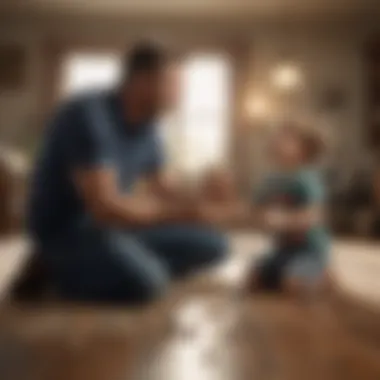Insights into the World of Divorced Dads: Navigating Life's Challenges


Understanding Relationship Dynamics and Challenges
Divorce often brings about complex relationship dynamics that divorced dads must navigate. These men face common issues such as communication breakdowns and conflicts with their ex-partners. The challenges can be particularly trying, requiring effective communication techniques to establish healthy boundaries and foster positive interactions. Divorced dads often seek strategies for resolving conflict, aiming to create amicable co-parenting relationships for the well-being of their children while still prioritizing their own mental and emotional wellness.
Personal Growth and Development
Amidst the upheaval of divorce, personal growth and development become crucial aspects for divorced dads. Embracing self-improvement tips helps men rebuild their identities post-divorce, fostering a sense of purpose and direction. Setting achievable goals and working towards success empowers these individuals to regain confidence and create a fulfilling life path despite the challenges faced during divorce. Managing stress and focusing on wellness are integral components of this journey, allowing divorced dads to prioritize their mental and physical health for a balanced post-divorce life.
Masculine Lifestyle Choices
With the newfound freedom that divorce can bring, divorced dads often explore masculine lifestyle choices as a means of self-expression and rejuvenation. Tips on men's fashion and grooming help these individuals present themselves with confidence and style, reinforcing a positive self-image. Guidance on health and fitness aids divorced dads in prioritizing their well-being, promoting a healthy lifestyle post-divorce. Exploring hobbies and interests emerges as a pivotal aspect of this phase, allowing these men to cultivate passions that bring joy and fulfillment to their lives.
Building Strong Connections
Rebuilding social connections is essential for divorced dads as they navigate life post-separation. Strengthening friendships and expanding one's social circles offer invaluable support systems and companionship during this transitional period. Nurturing romantic relationships, should one choose to pursue them, involves navigating the complexities of dating post-divorce while ensuring emotional readiness and openness. Effective networking techniques further enhance social connectivity, enabling divorced dads to forge new meaningful relationships and opportunities for personal and professional growth.
Enhancing Emotional Intelligence
Enhancing emotional intelligence is a cornerstone of the post-divorce journey for dads. Understanding and regulating emotions allows these individuals to navigate the turbulent waters of divorce with greater resilience and composure. Developing empathy and compassion in their relationships fosters healthier interpersonal connections and promotes understanding and patience. Cultivating healthy boundaries becomes imperative as divorced dads strive to uphold their emotional well-being, assert their needs, and establish respectful interactions in both personal and professional spheres.
Understanding Divorced Dads
Understanding Divorced Dads is a crucial section in this comprehensive article, shedding light on the intricate experiences and challenges divorced dads encounter post-divorce. By delving into the world of divorced fathers, we gain insights into their varied perspectives and practical wisdom. Exploring topics such as transitioning roles and responsibilities, emotional well-being, co-parenting dynamics, and personal identity, this section serves as a foundation for comprehending the multifaceted journey of divorced dads.
Transitioning Roles and Responsibilities


Balancing Parenting Duties
Balancing parenting duties is a fundamental aspect for divorced dads seeking equilibrium in their new family structure. It involves managing childcare responsibilities, nurturing family relationships, and fostering emotional support for children. The key characteristic of balancing parenting duties lies in the ability to juggle multiple roles while ensuring the well-being of all family members. This choice is essential in maintaining a stable environment and promoting healthy growth for children. However, the challenge of balancing these duties rests in the time and energy constraints it imposes on divorced fathers striving to meet various needs simultaneously.
Adjusting to Single-Parent Dynamics
Adjusting to single-parent dynamics requires divorced dads to adapt to a new family structure characterized by solo decision-making and increased responsibilities. The key characteristic of this adjustment is the necessity to redefine parental roles and establish a cohesive household routine. While embracing single-parent dynamics can empower fathers to strengthen their bond with their children and enhance their parenting skills, it also poses challenges in terms of emotional load and coping with the absence of a co-parent for support.
Impact on Emotional Well-being
Coping with Emotional Aftermath
Coping with the emotional aftermath of divorce is a vital aspect that divorced dads navigate post-separation. This process involves processing feelings of loss, grief, and transitioning to a new chapter in life. The key characteristic of coping with emotional aftermath is the resilience and emotional intelligence required to manage complex emotions effectively. While it offers an opportunity for personal growth and self-discovery, it also presents challenges in terms of emotional vulnerability and coping mechanisms.
Seeking Support for Mental Health
Seeking support for mental health is an essential step for divorced dads to prioritize their emotional well-being and resilience. This involves reaching out to mental health professionals, community support groups, or trusted individuals for guidance and counseling. The key characteristic of seeking support lies in recognizing the importance of mental health in navigating life after divorce. While it can provide a crucial lifeline for managing stress and emotional challenges, seeking support may also require vulnerability and openness to therapy and self-reflection.
Co-Parenting Dynamics
In this section, the focus shifts towards the pivotal aspect of Co-Parenting Dynamics in the context of understanding the world of divorced dads. Co-parenting plays a significant role as divorced dads strive to navigate their post-divorce journey with resilience and responsibility. By delving into specific elements such as Effective Communication Strategies and Prioritizing Children's Needs, divorced dads can develop a collaborative and supportive co-parenting environment. This topic holds relevance due to its influence on the emotional well-being of both the dads and their children after a divorce. Through effective co-parenting dynamics, divorced dads can instill stability and harmony in their children's lives while fostering mutual respect and communication in their shared parental responsibilities.
Effective Communication Strategies
Establishing Boundaries
Under the umbrella of Effective Communication Strategies, Establishing Boundaries emerges as a crucial component for successful co-parenting dynamics. The key characteristic of Establishing Boundaries lies in creating clear guidelines and expectations within the co-parenting relationship to maintain respect and promote healthy boundaries. This approach is a popular choice for this article as it fosters effective communication, reduces conflicts, and helps establish a structured framework for co-parenting interactions. One unique feature of Establishing Boundaries is its ability to provide a sense of security and predictability for both the divorced dads and their co-parents, thereby enhancing overall co-parenting efficacy.


Prioritizing Children's Needs
Another vital aspect of Effective Communication Strategies is the emphasis on Prioritizing Children's Needs. This element contributes significantly to the overall goal of promoting a child-centric co-parenting environment post-divorce. Prioritizing Children's Needs entails focusing on the well-being and emotional stability of the children above all else, ensuring that their best interests remain at the forefront of all co-parenting decisions and interactions. This choice aligns with the theme of the article as it highlights the importance of fostering a supportive and nurturing parental dynamic that prioritizes the children's developmental and emotional needs. While this approach offers numerous advantages in enhancing co-parenting relationships and children's adjustment post-divorce, potential challenges may arise in balancing parental desires with children's needs, requiring constant communication and flexibility among divorced dads and co-parents.
Navigating Co-Parenting Challenges
Managing Conflicting Schedules
Within the realm of Navigating Co-Parenting Challenges, the aspect of Managing Conflicting Schedules emerges as a significant factor affecting co-parenting dynamics for divorced dads. The key characteristic of Managing Conflicting Schedules lies in the ability to coordinate and synchronize parenting responsibilities effectively among divorced parents with disparate schedules. This choice is beneficial for this article as it addresses the common challenge faced by divorced dads in aligning their schedules with their co-parents to ensure a seamless co-parenting experience. The unique feature of Managing Conflicting Schedules lies in its capacity to promote accountability and shared commitment to the children's routines and activities, minimizing disruptions and promoting consistency in co-parenting arrangements.
Dealing with Differing Parenting Styles
Complementing the discussion on Navigating Co-Parenting Challenges, Dealing with Differing Parenting Styles emerges as an essential consideration for divorced dads navigating post-divorce co-parenting dynamics. The key characteristic of Dealing with Differing Parenting Styles revolves around understanding and accommodating diverse parenting approaches between co-parents to ensure a harmonious co-parenting environment. This choice is popular for this article as it emphasizes the importance of flexibility, open-mindedness, and compromise in reconciling conflicting parenting styles for the well-being of the children. The unique feature of Dealing with Differing Parenting Styles lies in its potential to encourage parental cooperation, creative problem-solving, and mutual respect despite differing viewpoints, fostering a collaborative and enriching co-parenting experience for all involved.
Rebuilding Personal Identity
In this article, 'Rebuilding Personal Identity' plays a pivotal role in exploring the post-divorce journey of dads. Following a significant life transition like divorce, rediscovering a sense of self is paramount for emotional well-being and personal growth. Embracing one's identity beyond the constraints of marriage can lead to increased self-awareness and confidence in navigating life independently.
Rediscovering Self-Worth
Exploring Individual Passions
'Diving into individual passions' is a crucial aspect that contributes to the overall theme of rebuilding personal identity after divorce. By immersing oneself in activities and interests that bring joy and fulfillment, divorced dads can reignite their sense of purpose and creativity. The exploration of personal passions allows for self-discovery and a reconnection with parts of oneself that may have been neglected during marriage. This pursuit not only fosters personal growth but also cultivates a deeper understanding of one's own desires and aspirations.
Fostering Self-Care Practices
The aspect of 'Fostering self-care practices' holds a significant role in the journey of rediscovering self-worth post-divorce. Prioritizing self-care routines and habits can be transformative in restoring a sense of balance and well-being. By engaging in self-care activities, divorced dads can nurture their mental, emotional, and physical health, ultimately enhancing their overall quality of life. Adopting self-care practices promotes resilience and assists in coping with the challenges of divorce, fostering a positive outlook on the future.


Embracing Growth Opportunities
Pursuing Personal Development
'Embarking on personal development' contributes profoundly to the overarching goal of rebuilding personal identity after divorce. By actively pursuing avenues for growth and learning, divorced dads can expand their horizons, acquire new skills, and rediscover their potential. Engaging in personal development initiatives empowers individuals to explore untapped abilities, broaden their perspectives, and adapt to new life circumstances with resilience and adaptability.
Reconnecting with Social Circles
'Reconnecting with social circles' is a vital element in embracing growth opportunities post-divorce. Building and strengthening social connections can provide divorced dads with a support system, companionship, and a sense of belonging. Reconnecting with friends, family, and community networks fosters social integration, diminishes feelings of isolation, and promotes emotional well-being. Engaging in social interactions catalyzes personal growth, facilitates shared experiences, and encourages a sense of camaraderie and unity within one's social sphere.
Building Healthy Relationships
Building healthy relationships post-divorce is a crucial aspect of personal growth and well-being for divorced dads. Establishing new connections based on mutual respect and understanding can enhance emotional stability and social support networks. By fostering positive interactions with individuals who align with their values and goals, divorced dads can lay the foundation for a fulfilling future. It is essential to prioritize open communication, empathy, and reciprocity in building healthy relationships to promote emotional wellness and personal development.
Navigating the Dating Scene
Exploring new relationship dynamics
Exploring new relationship dynamics after a divorce opens up opportunities for self-discovery and companionship. This aspect allows divorced dads to approach relationships with a fresh perspective, free from past constraints. Embracing new ways of relating provides avenues for personal growth and understanding different forms of connection. However, it is crucial to approach these dynamics with caution, recognizing the need for healthy boundaries and self-awareness to navigate these uncharted waters successfully.
Setting boundaries for emotional wellbeing
Setting boundaries for emotional well-being is paramount in the post-divorce dating scene. Divorced dads need to establish clear and respectful boundaries to safeguard their mental and emotional health. By defining limits on emotional investment and outlining expectations, they can protect themselves from potential hurt or misunderstandings. These boundaries not only foster self-respect but also communicate needs effectively, contributing to healthier and more fulfilling relationships.
Prioritizing Children's Well-being
Balancing parental responsibilities
Balancing parental responsibilities post-divorce requires divorced dads to juggle various aspects of co-parenting and personal growth. Striking a balance between fulfilling their duties as parents and nurturing their individual well-being is crucial. Divorced dads must prioritize quality time with their children while also allocating time for self-care and personal pursuits. Creating a sustainable equilibrium between these responsibilities is vital for the overall well-being of both the dads and their children.
Fostering positive interactions with children
Fostering positive interactions with children post-divorce is fundamental for maintaining strong parent-child relationships. Encouraging open communication, active listening, and emotional support can cultivate a healthy environment for parent-child interactions. By nurturing positive experiences and meaningful connections with their children, divorced dads can contribute to their children's emotional security and overall well-being. Engaging in activities that foster bonding and understanding can strengthen the parent-child bond and promote a positive co-parenting dynamic.



